FAQs
- Error Codes for Sanden Heat Pump G4 GAU-A45HPC
The HP will display an error code if it is unable to function normally.
Error codes are indicated by a red LED on the control panel. The control panel is visible via a small window at the right side of the heat pump and it can be accessed by removing the heat pump top cover (4 screws).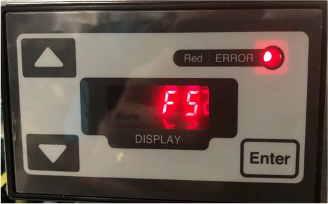
After a component is replaced or the inspection is completed, cycle power to the unit several times to confirm the error does not re-occur.
Below is the list of the error codes. If the corrective action does not solve the error problem, a malfunction of the PCB valve is highly likely.Error
code
Reason for the error
Corrective action
H9
HP ambient(outdoor)
temperature thermistor error
Check the thermistor connectors on the main PCB or control PCB in the heat pump unit for any disconnection, fall-off, wire breakage or short circuit.
Measure resistance of the thermistor indicated by the error code.
HC
HPwater outlet (outgoing)
temperature thermistor error
J3
HP discharge temperature
thermistor error
J5
HP suctiontemperature
thermistor error
J6
HP defrosttemperature
thermistor error
J8
HPwater inlet (return)
temperature thermistor error
H7
Tank temperature thermistor error
- Check the thermistor cable on the terminal block in the heat pump unit for any disconnection, fall-off, wire breakage or short circuit.
- Measure resistance of the thermistor indicated by the error code.
E6
Compressor bootingerror
- Check the compressor connector.
- Replace the main PCB or heat pump.
H6
Compressor revolution error
- Check the supply voltage.
- Measure resistance of each thermistor.
- Measure resistance of coil of expansion valve to check open or short circuit.
Error
code
Reason for the error
Corrective action
Replace the PCB or heat pump.
U0
Refrigerant leakageerror
- Measure resistance of each thermistor.
- Measure resistance of coil of expansion valve to check open or short circuit.
- Replace the main PCB or heat pump.
E1
Main PCB error
Replace the control PCB.
E2
L7
Control PCB error
Replace the control PCB.
F5
Communication error between main PCB to control PCB
- Check the communication connector on the main PCB and control PCB.
- Replace the main PCB or control PCB.
E8
High inlet current error
- Check the installation location.
- Check the supply voltage.
- Replace the main PCB or heat pump.
H8
Current error
Replace the main PCB.
L4
High temperature of module error
- Check the installation location.
- Remove foreign objects from the evaporator coil (e.g. fallen leaves, grass, snow).
- Check the fan motor is not flowing by dirt.
- Replace the main PCB or fan motor.
L5
High outlet current error
- Measure resistance of the discharged thermistor.
- Measure resistance of coil of expansion valve to check open or short circuit.
- Replace the main PCB or heat pump.
P4
Module temperature
thermistor error
Replace the main PCB.
U2
High voltage error
Check the supply voltage.
HJ
Water circuit error
- Check the inlet water valve.
- Check for any piping bend, blockage, kink or frozen.
- Measure resistance of each thermistor.
- Measure resistance of coil of expansion valve to check open or short circuit.
- Replace the main PCB or heat pump.
EC
High water outlet error
- Check the water circuit is not flowing by air, dirt or scaling.
- If the water circulation pump is not working, replace the pump.
- Measure resistance of water outlet (outgoing) thermistor.
- Replace the main PCB.
E9
Water circulation pump error
- Check the water is full in the tank.
- If the water circulation pump is not working, replace the pump.
- Check the revolution of pump by controller. If the revolution is low, replace the pump.
- Replace the main PCB.
Error
code
Reason for the error
Corrective action
E7
Fan motor locked
- Remove foreign objects around the fan motor.
- Check the fan motor connectors on the main PCB.
- Replace the main PCB.
F3
Discharged temperature error
- Measure resistance of the discharged thermistor.
- Replace the main PCB or heat pump.
Error
code
Reason for the error
Corrective action
H9
HP ambient(outdoor)
temperature thermistor error
Check the thermistor connectors on the main PCB or control PCB in the heat pump unit for any disconnection, fall-off, wire breakage or short circuit.
Measure resistance of the thermistor indicated by the error code.
HC
HPwater outlet (outgoing)
temperature thermistor error
J3
HP discharge temperature
thermistor error
J5
HP suctiontemperature
thermistor error
J6
HP defrosttemperature
thermistor error
J8
HPwater inlet (return)
temperature thermistor error
H7
Tank temperature thermistor error
- Check the thermistor cable on the terminal block in the heat pump unit for any disconnection, fall-off, wire breakage or short circuit.
- Measure resistance of the thermistor indicated by the error code.
E6
Compressor bootingerror
- Check the compressor connector.
- Replace the main PCB or heat pump.
H6
Compressor revolution error
- Check the supply voltage.
- Measure resistance of each thermistor.
- Measure resistance of coil of expansion valve to check open or short circuit.
Error
code
Reason for the error
Corrective action
Replace the PCB or heat pump.
U0
Refrigerant leakageerror
- Measure resistance of each thermistor.
- Measure resistance of coil of expansion valve to check open or short circuit.
- Replace the main PCB or heat pump.
E1
Main PCB error
Replace the main PCB.
E2
L7
Control PCB error
Replace the control PCB.
F5
Communication error between main PCB to control PCB
- Check the communication connector on the main PCB and control PCB.
- Replace the main PCB or control PCB.
E8
High inlet current error
- Check the installation location.
- Check the supply voltage.
- Replace the main PCB or heat pump.
H8
Current error
Replace the main PCB.
L4
High temperature of module error
- Check the installation location.
- Remove foreign objects from the evaporator coil (e.g. fallen leaves, grass, snow).
- Check the fan motor is not flowing by dirt.
- Replace the main PCB or fan motor.
L5
High outlet current error
- Measure resistance of the discharged thermistor.
- Measure resistance of coil of expansion valve to check open or short circuit.
- Replace the main PCB or heat pump.
P4
Module temperature
thermistor error
Replace the main PCB.
U2
High voltage error
Check the supply voltage.
HJ
Water circuit error
- Check the inlet water valve.
- Check for any piping bend, blockage, kink or frozen.
- Measure resistance of each thermistor.
- Measure resistance of coil of expansion valve to check open or short circuit.
- Replace the main PCB or heat pump.
EC
High water outlet error
- Check the water circuit is not flowing by air, dirt or scaling.
- If the water circulation pump is not working, replace the pump.
- Measure resistance of water outlet (outgoing) thermistor.
- Replace the main PCB.
E9
Water circulation pump error
- Check the water is full in the tank.
- If the water circulation pump is not working, replace the pump.
- Check the revolution of pump by controller. If the revolution is low, replace the pump.
- Replace the main PCB.
Error
code
Reason for the error
Corrective action
E7
Fan motor locked
- Remove foreign objects around the fan motor.
- Check the fan motor connectors on the main PCB.
- Replace the main PCB.
F3
Discharged temperature error
- Measure resistance of the discharged thermistor.
- Replace the main PCB or heat pump.
- How does a heat pump hot water (HPHW) system work?
The Sanden Eco® Plus heat pump hot water (HPHW) system operates like a refrigerator in reverse. It contains a fan that forces air through an evaporator that contains a refrigerant. The heat in the ambient air passes through the evaporator (note: even air below 0 º C contains heat energy) and is absorbed by a natural refrigerant, R744 (aka CO2), which is ozone friendly and does not significantly contribute to global warming compared with most other refrigerants (older style refrigerants have thousands of times more global warming impact for the same amount of gas, when compared with CO2).
The warm gaseous refrigerant is circulated in the system via a compressor. As it passes through the compressor, its pressure rises, as does its temperature. This hot refrigerant then passes through a heat exchanger to heat the water, which is finally pumped to the storage tank.
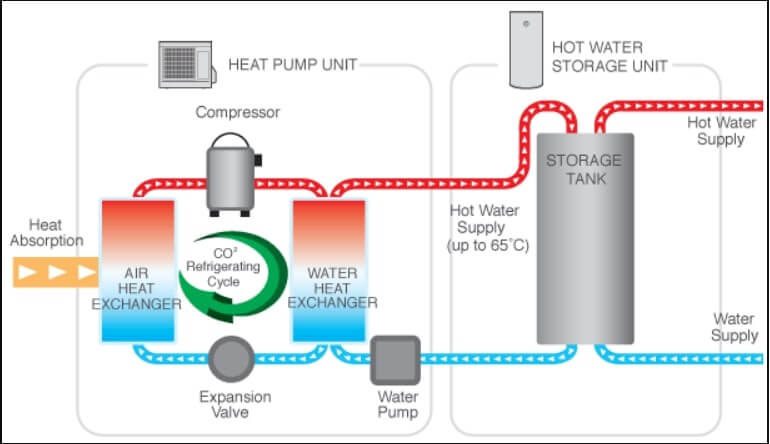
- What do I do if the Sanden Eco® Plus heat pump hot water system has a problem?
Check our comprehensive Sanden not working checklist here if you think you have a problem with your Sanden Eco heat pump hot water system.
If you're still unsure after going through this guide - please lodge a Pure Electric Service Case here
- Why does the Sanden Eco® Plus use CO2 as its working gas? Isn’t CO2 a greenhouse gas and therefore harmful to the environment?
Why does the Sanden use CO2 as its working gas, what is the benefit?
- There is far less environmental impact (i.e. No ozone layer depletion and minimal global warming) than other commonly used refrigerants, should the system leak.
- There is a much higher efficiency, thereby allowing more heat to be transferred to the water, for less energy used (i.e. Excellent thermodynamic ability).
Isn't CO2 a greenhouse gas and therefor bad for the environment?
While it is true that Carbon Dioxide (CO2) is a greenhouse gas it has a Global Warming Potential (GWP) of 1. Whereas refrigerant gases in other heat pumps can have GWP of over 10,000, which means if they leak to the atmosphere they contribute 10,000 times more to global warming compared with the refrigerant gases used in a Sanden Eco Plus.
The table below shows the GWP for some common refrigerant gases (note: GWP must include a time interval over which the greenhouse gases act, in this case 100 years)
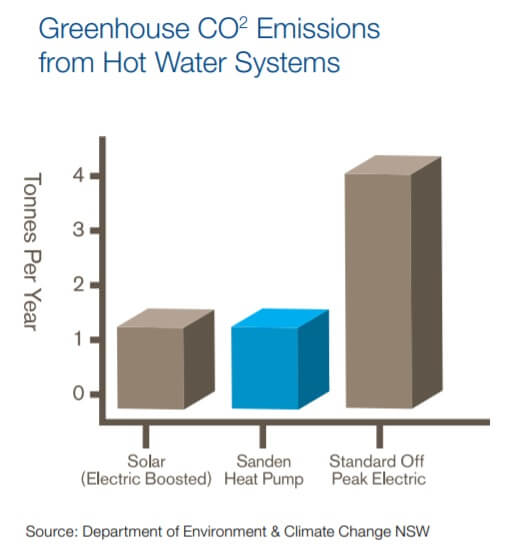
Our system utilizes less than 1 kg of R744 (CO2) as a refrigerant contained in a closed system at the factory. The installer does not need to charge the heat pump on site.
- There is far less environmental impact (i.e. No ozone layer depletion and minimal global warming) than other commonly used refrigerants, should the system leak.
- Do I need to register my Sanden Eco Plus warranty?
- Uploading Photos for Sanden Eco Heat Pump Quote
Uploading Photos for Sanden Eco Heat Pump Quote
As heat pump hot water systems receive Government subsidies and rebates, Government authorities are requiring all photos are GEO-tagged to comply.
If you are unsure that your photos are GEO-tagged, we have a helpful Geo-tag guide on our website here -> https://pure-electric.com.au/resources/geo-tagging-helpful-guide
You can test if your photos are GEO-tagged by uploading photos to this website -> https://tool.geoimgr.com/
Please see below some photo tip examples for uploading photos to your Sanden Eco heat pump quote request.
Existing Hot Water System (Left)
Photo Tips: 2-3m to the left of the tank and up to the eaves
Existing Hot Water System (Right)
Photo Tips: 2-3m to the right of the tank and up to the eaves
Existing Hot Water System (Serial Number)
Photo Tips: Clear and readable
Switchboard
Photo Tips: Clear and readable so if you zoom in you can see the circuit breaker rating, enclosure flaps are open
Meterbox (Outline)
Photo Tips: Meterbox Door Open
Old Tank Details (Example filled in:)
Old Tank Make: Rheem
Old Tank Model: 315T136G
Old Tank Serial: 33633XXXX
Old Tank Date: 15/03/2006
If you have a renovation with a new hot water system location, please share a photo that confirms both hot and cold connections are presented:
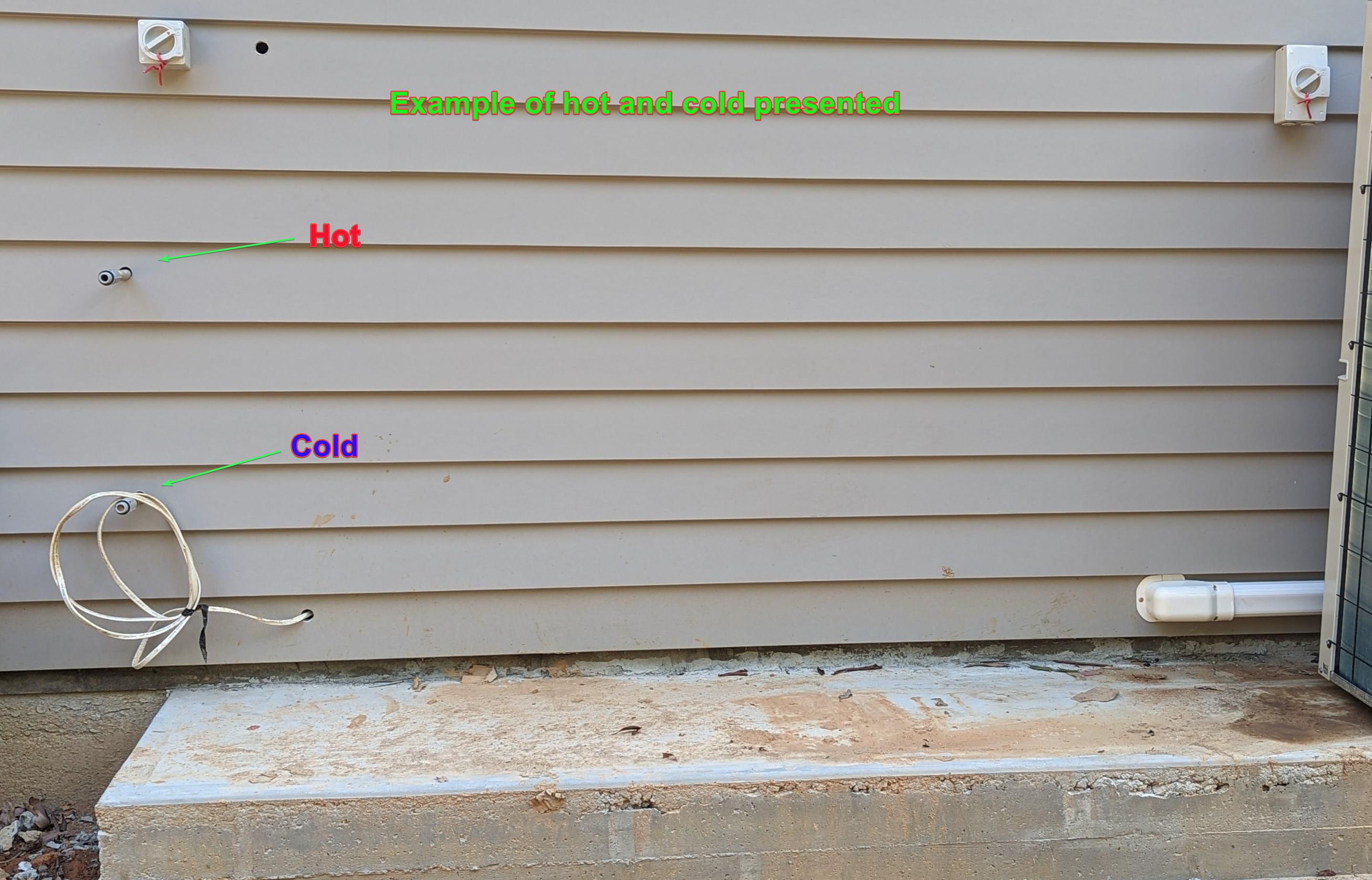
- What is the noise level of the Sanden Eco® Plus heat pump hot water system?
The unit is rated at 37dB (measured at one metre from the unit), which is almost silent. By comparison, a whisper is around 30dB and the sound of the inside of a Library is approximately 40dB.
- Sanden Eco Hot Water Tank Size Options? Which tank size should I choose?
The Sanden Eco Plus hot heat pump hot water system is available in the following five sizes with our sizing guide below:
Tank size/shape Tank Code System No. of People No. of Bathrooms Dwelling type Off-peak & Continuous tariffs? Tank Diameter (mm) Tank Height (mm) 160L SS SAN-160SAQA GAUS-160FQTS 1 1 Bedsits Continuous only 621 970 250L SS
SAN-250SAQA GAUS-250FQTD 1-3 1-2 Residential Both 621 1428 250L SS Tall Slim SAN-250SAQD GAUS-250FQTD 1-3 1-2 Residential Both 580 1635 300L SS Tall Slim SAN-300SAQA GAUS-300FQTS 2-6 1-3 Residential Both 580 1891 300L SS Tall Slim SAN-300SAQD GAUS-300FQTD 2-6 1-3 Residential Both 580 1905 315L SS SAN-315SAQA GAUS-315FQTS 2-6 1-3 Residential Both 621 1748 315L SS Tall Slim SAN-315SAQD GAUS-315FQTD 2-6 1-3 Residential Both 580 2000 315L VE SAN-315VE GAUS-315FQTV 2-6 1-3 Residential Both 638 1626 *SS = Stainless Steel // VE = Vitreous Enamel
The same Sanden Heat Pump condenser unit is used in combination with different tanks sizes. So which tank size you would like?
When considering tank sizes - we need to consider a few factors - number of people, number of bathrooms, the heat recovery rate.
If you're using an existing hot water system for comparison - here are some comments/thoughts:
If you have an existing gas storage hot water system (e.g. 130L / 170L) - these are much smaller in capacity but they will reheat several times a day. Therefore the Sanden tank size will be larger than an existing gas storage replacement with the Sanden re-heat typically only required once per day - a good opportunity to maximise rooftop solar PV production or to utilise an off peak tariff.
If you have an existing electric storage hot water system (e.g. 400L 3.6kW unit) - these electric storage 3.6kW units recover heat at a slower rate (60L/hr) compared to a Sanden heat pump (approx. 80L/hr). Therefore a 400L electric storage hot water system would equate to a 300L/315L Sanden system in this example.
Based on our years providing the Sanden Eco heat pump hot water system - here are our tank recommendations for different scenarios (SS - Stainless Steel // VE - Vitreous Enamel):
160L SS: Only recommended for 1 person bedsits. This tank size is rarely chosen and due to its small tank size must be run in Continuous only mode (no blockout timer can be set up).
250L SS: Typically 1-3 person household with 1 bathroom. Height just under 1.5m with tank diameter 621mm.
250L SS Tall Slim: Typically 1-3 person household with 1 bathroom. Height just under 1.635m with tank diameter 580mm.
300L SS: The Tall Slim - the most popular and best recommended tank choice. Recommended for 2-6 people. Tank diameter 580mm and tank height just under 1.9m. If no height restrictions apply, this is the recommended tank for majority of situations and considered best value for money across the tank sizes.
315L SS: The largest tank size with an additional 15L delivered hot water (5% more) compared to the 300L Tall Slim tank. Tank diameter 621mm with tank height 1.74m - this is recommended if the 300L tall slim tank is too tall for your application.
315L SS Tall Slim: The largest tank size with an additional 15L delivered hot water (5% more) compared to the 300L. Tank diameter 580mm with tank height 2m - this is recommended if you're a very high hot water user.
315L VE: Tank diameter 638mm with tank height 1.63m with 315L delivered hot water. This VE tank is specified for poor water quality areas - you can identify if you are in a poor water quality area via the Sanden website -> https://www.sanden-hot-water.com.au/check-water-quality/
- There is a red LED flashing on the Sanden heat pump display panel should I be worried?
The flashing red dot (LED) indicates the Sanden heat pump unit is currently in 'sleep mode', it is perfectly normal and nothing to worry about.
We consider this the "Sanden Heart Beat". If you see a red flashing dot, the heart is beating and all is well for your Sanden heat pump.
This controller display with the red flashing dot is applicable to the following Sanden heat pump models:
Sanden G3 - "GS3-45HPA-AU"
Sanden G4 - "GAU-A45HPC"
Sanden G5 - "GAU-A45HPD"
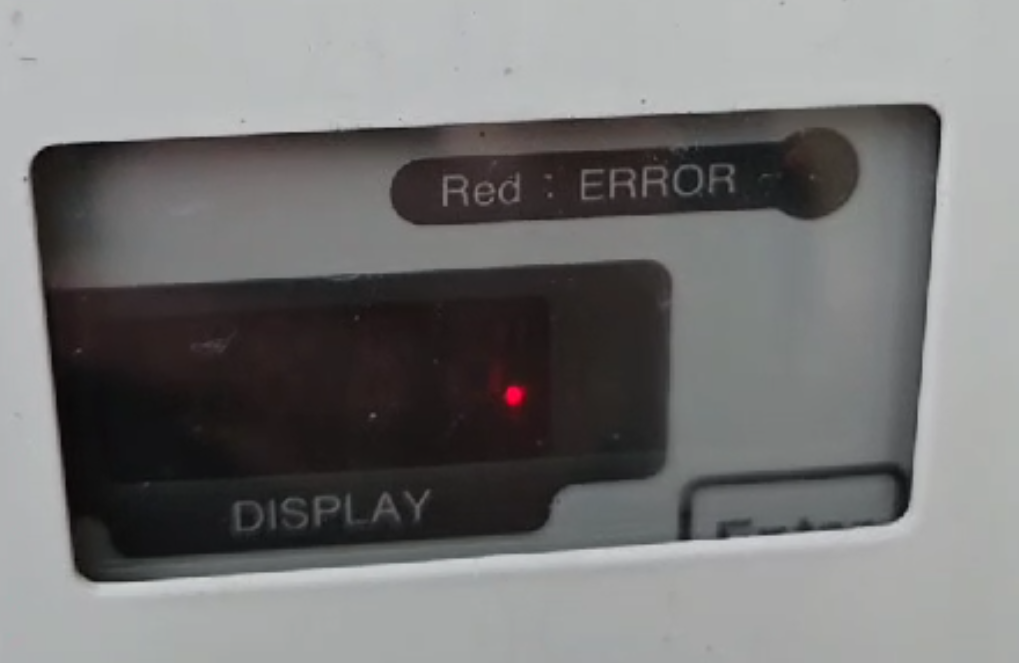
- The cold water valve (or ECV) on my Sanden is leaking a lot what is causing this?
To answer the question why is my cold water valve (or ECV) on my Sanden leaking a lot what is causing this? A few elements to consider.
To protect your Sanden unit from excessive pressure there are three valves:
Valve 1. The pressure reduction valve (PRV) which is located on the water inlet to your home and is set to 500kPa. This valve is designed to keep the pressure out of any tap in your house below 500 kPa.
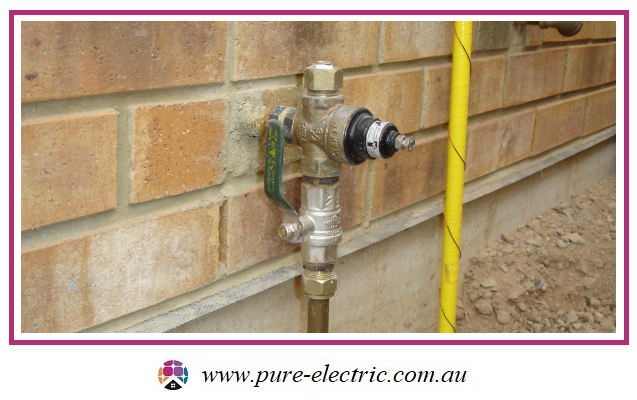
Valve 2. The expansion control valve (ECV) which is located on the cold water inlet to your Sanden and is set to 600 kPa. This valve is designed to relieve cold water instead of hot water during the heating cycle (which increases pressure in the tank) which saves you money and protects the final valve, the PTR.
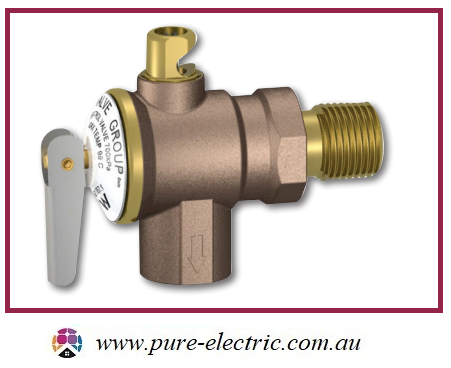
Valve 3. The Pressure and temperature relief valve (PTR) which is located on the hot water outlet to the Sanden and is set to 700 kPa. This valve is designed to release hot water from your tank if the pressure gets too high or the water heating cut-off fails to work.
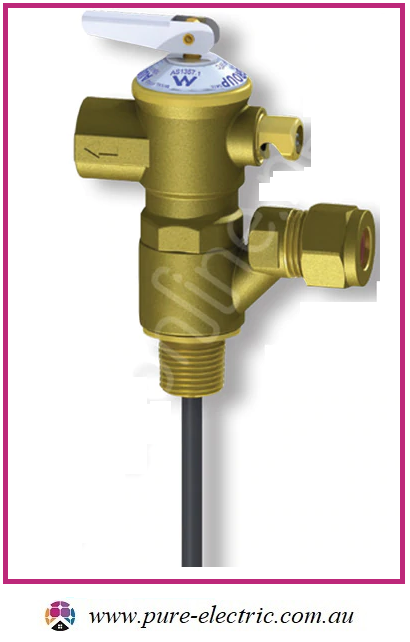
One of the main reasons ECV valves leak water excessively (apart from wear and tear or malfunction) is excessive water pressure in the mains supply which is not properly being reduced by a PRV as it enters your house to at or below 500 kPa; in many areas the mains water pressure is 850 kPa + this is to ensure fire fighters have enough pressure to use their fire hoses properly in the event of a fire.
Note: the Australian standard covering water pressure in the home (AS 3500.1:2018) mandates that water pressure in your home must be kept below 500 kPa as water pressure above 500 kPa has the potential to damage valves, tap fittings, flexible hose fitting etc as the components are only rated to withstand pressures at or below 500 kPa.
So if you notice that the expansion control valve (valve 2 discussed earlier) on your Sanden is leaking excessively chances are you have excessive water pressure at your house and your PRV (valve 1) is either not present or not working.
Either way you should get a plumber to check the water pressure in your house and make sure you have a functional PRV. You can also buy a cheap pressure meter from a hardware shop if you want to check your household water pressure yourself: Note your mains pressure is not constant it will change based on a number of factors including local water use, time of day, time of year or changes in your local area such as new housing being built etc.

